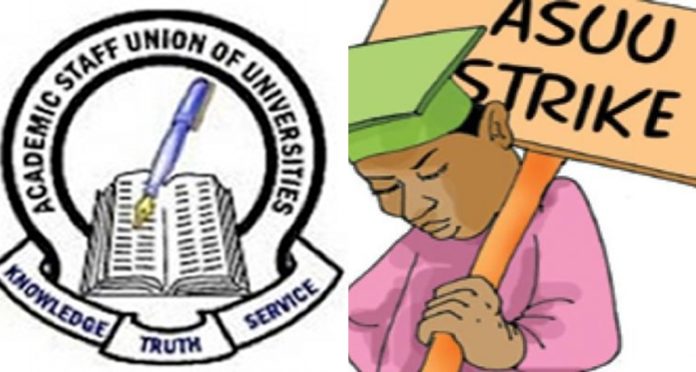By Boluwatife Adedokun
The Academic Staff Union of Universities (ASUU) on Monday, October 13, 2025, commenced a two-week nationwide warning strike, citing unresolved demands from the federal government — including unpaid entitlements and the non-implementation of earlier negotiated agreements — that the union says have persisted despite months of talks.
Related Posts:
The action has already disrupted examinations at several institutions and prompted the Federal Government to direct vice-chancellors to enforce a “no work, no pay” policy on absent lecturers.
The immediate facts
ASUU’s National Executive Council announced the strike after an ultimatum to the Federal Government expired. The union described the stoppage as “total and comprehensive” and said it will last for two weeks unless the government takes concrete steps to meet its demands. Many federal universities, including the University of Ibadan, joined the action immediately.
In response, the Minister of Education instructed vice-chancellors of federal universities to apply the “no work, no pay” rule for any staff who stay away from duty during the strike, a move the government says is intended to protect public interest and deter prolonged industrial action. ASUU maintains that partial payments and piecemeal measures offered so far do not address the core issues.
Why ASUU walked out
ASUU’s grievances bundle several long-running concerns;
The union says members experienced delayed salary payments (notably in June 2025) and invoked its “No Pay, No Work” position in response.
ASUU insists the Federal Government has failed to fully implement elements of the 2009 FG-ASUU agreement — a blueprint ASUU says is crucial for university revitalisation, earned allowances and improved working conditions.
Broader complaints include inadequate welfare, poor infrastructure and a pay structure that has not kept pace with rising costs.
ASUU described an “emergency meeting” with government negotiators as unsatisfactory, saying nothing significant changed the union’s position before the strike directive.
Government posture and political response
The Federal Government maintains that it has met many of ASUU’s demands and characterised the strike as unjustified, while warning that salaries for striking lecturers will be withheld if they fail to resume work. The Education Minister has signalled readiness for constructive talks but has also asked university managements to apply sanctions consistent with public service rules.
Legislators and other stakeholders have begun to intervene, with the House of Representatives publicly urging swift action to avert a breakdown of the university system. Labour groups and the Nigeria Labour Congress have expressed solidarity with ASUU and criticised the punitive “no work, no pay” directive.
Impact on students and academic calendars
Universities across the country reported an immediate disruption of lectures and, in some cases, examinations. Several campuses postponed ongoing second-semester exams or told students they would receive updates on rescheduling — compounding the backlog from previous strikes and creating uncertainty for final-year students awaiting graduation, prospective graduates seeking employment, and applicants to postgraduate programmes. Premium Times Nigeria+1
Student bodies, including the National Association of Nigerian Students (NANS), have issued ultimatums and called for fast negotiations, warning that prolonged closures would deepen hardship and undermine national capacity.
Stakes and wider consequences
Repeated stoppages have direct and indirect costs: delayed graduations, stalled research programmes, lower institutional productivity, and reputational damage that can affect funding and international partnerships. Lawmakers warn that continued disruptions could worsen brain drain and reduce public confidence in tertiary education , a risk with long-term implications for development and the labour market.
Possible outcomes
Analysts see three realistic paths:
Rapid negotiated settlement: The government offers a clear timetable for outstanding payments and a credible roadmap to implement parts of the 2009 agreement, with monitoring arrangements — ASUU suspends strike.
Protracted standoff: If the government’s measures are deemed insufficient, the warning strike could be extended into a full industrial action, deepening academic disruption.
Interim truce with oversight: A temporary pause while a joint committee (parliamentary or independent) verifies government commitments — politically feasible but requires enforceable milestones.
What would de-escalate the crisis
Sources and stakeholders agree on pragmatic steps likely to break the deadlock:
Immediate, verifiable payment of outstanding salaries or a published schedule for disbursement.
A binding timeline to implement critical elements of the 2009 FG-ASUU agreement, monitored by an independent committee.
Short-term academic mitigations (exam catch-ups, accelerated sessions for final-year students) to limit harm to students.
ASUU officials insist the strike was a last resort after prolonged frustration with incremental government responses; government officials counter that major concessions have already been made and that punitive measures may be needed to protect the public purse. Student leaders, meanwhile, demand urgent talks and tangible solutions so their academic progress is not sacrificed.











No Comments